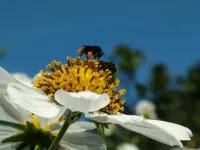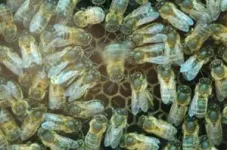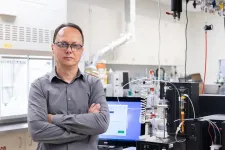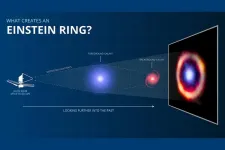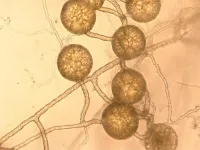(Press-News.org) Human influences have the potential to reduce the effectivity of communication in bees adding further stress to struggling colonies, according to new analysis.
Scientists at the University of Bristol studying honeybees, bumblebees and stingless bees found that variation in communication strategies are explained by differences in the habitats that bees inhabit and differences in the social lifestyle such colony size and nesting habits.
The findings, published today in PNAS, reveal that anthropogenic change, such as habitat conversion, climate change and the use of agrochemicals, are altering the world bees occupy, and it is becoming increasingly clearer that this affects communication both directly and indirectly, for example by affecting food source availability, social interactions among nestmates and their cognitive functions.
How bees adapt their foraging and communication strategies to cope with these threats is a new and pressing area in bee behavioural and conservation research.
Social bees are among the most important pollinators due to their foraging activity. Different types of bees use different communication methods to exploit food sources. Honeybees use the waggle dance and some stingless bees use pheromone trails, but it is still not well understood why different bees use different methods to solve the same problem, which is finding food efficiently.
Author Christoph Grueter from Bristol’s School of Biological Sciences explained: “We have synthesised the recent literature to explain how differences in ecology and sociality explains this variation.
“It is known that anthropogenic effects, such as climate change, pesticides and habitat loss negatively affect social bees.
“The research we analysed shows that different bees have found many different solutions to the problem of finding good food sources in an efficient way. Anthropogenic change has the potential to interfere with bee communication and behaviours that have helped bees be successful for millions of years might suddenly no longer be equally beneficial.”
As communication behaviours help colonies exploit resources, more research is needed to understand how human-caused changes impacts their communication.
The team now plan to establish how habitat loss, climate change and pesticides affect communication behaviours in bees.
Paper:
‘Diverse communication strategies in bees as a window into adaptations to an unpredictable world’ by Christoph Grueter et al in PNAS.
END
Human factors affect bees’ communication, researchers find
2023-06-05
ELSE PRESS RELEASES FROM THIS DATE:
Coaxing hair growth in aging hair follicle stem cells
2023-06-05
· Regulating cell mechanics stimulates hair growth in mice
· Next step will be testing if delivering microRNA via nanoparticles grows hair
· Potential for human hair growth
CHICAGO --- Just as people’s joints can get stiff as they age and make it harder for them to move around, hair follicle stem cells also get stiff, making it harder for them to grow hair, reports a new Northwestern Medicine study.
But if the hair follicle’s stem cells are softened, ...
Cure Mito Foundation launches resource on Leigh syndrome
2023-06-05
McKinney, TX., June 5, 2023 - The Cure Mito Foundation, a parent-led organization dedicated to advancing research and treatments for Leigh syndrome, has launched the first-of-its-kind online resource about Leigh syndrome, the most common type of pediatric mitochondrial disease.
The free resource, “About Leigh Syndrome” (https://www.aboutleighsyndrome.com), serves as a central place where patients, caregivers and doctors can find information on Leigh syndrome, including its symptoms, diagnosis, treatment options, and more. Translation ...
Tools to assess crime risk for young cohorts are likely to fail over time if they ignore social change
2023-06-05
Risk assessment instruments (RAIs) are widely used to inform high-stakes decision making in the criminal justice system and other areas, such as health care and child welfare. These tools typically assume a relation between predictors and outcomes that does not vary with time. But because societies change, this assumption may not hold in all settings, generating what a new study calls cohort bias—a bias resulting from cohort-wide influences not experienced by past or future cohorts.
The study, by researchers ...
Direct air capture technology licensed to Knoxville-based Holocene
2023-06-05
An innovative and sustainable chemistry developed at the Department of Energy’s Oak Ridge National Laboratory for capturing carbon dioxide from air has been licensed to Holocene, a Knoxville-based startup focused on designing and building plants that remove carbon dioxide from atmospheric air.
“ORNL is tackling climate change by developing numerous technologies that reduce or eliminate emissions,” said Susan Hubbard, ORNL deputy for science and technology. “But with billions ...
Fetal exposure to PCBs affects hearing health later in life
2023-06-05
Music, mice, and microscopic imaging combine to provide new insight into the effects of environmental chemicals on hearing loss.
Researchers at the Beckman Institute for Advanced Science and Technology found that early exposure to an environmental chemical called polychlorinated biphenyls, or PCBs, made it more difficult for mice to recover from sound-related trauma sustained later in life.
Their paper appears in the Journal of Neuroscience.
PCBs are carcinogenic compounds formerly used in industrial and consumer products. Although they were banned in the United States in 1979 and haven’t seen industrial use in decades, their highly ...
Quantum computers are better at guessing, new study demonstrates
2023-06-05
Daniel Lidar, the Viterbi Professor of Engineering at USC and Director of the USC Center for Quantum Information Science & Technology, and first author Dr. Bibek Pokharel, a Research Scientist at IBM Quantum, achieved this quantum speedup advantage in the context of a “bitstring guessing game.” They managed strings up to 26 bits long, significantly larger than previously possible, by effectively suppressing errors typically seen at this scale. (A bit is a binary number that is either zero or one).
Quantum computers promise to solve certain problems with an advantage that increases as the ...
New discoveries about where atherosclerotic plaques rupture can lead to preventive treatments
2023-06-05
A common cause of myocardial infarction and stroke is the rupture of atherosclerotic plaques. The exact location of plaque ruptures has previously been unknown, but now researchers at Lund University have mapped this. The research team has also identified an enzyme, a marker, that they hope will help predict who is at risk of having a myocardial infarction or a stroke due to a ruptured atherosclerotic plaque.
In atherosclerosis , fat is accumulated in the artery walls creating atherosclerotic ...
Webb Space Telescope detects universe’s most distant complex organic molecules
2023-06-05
CHAMPAIGN, Ill. — Researchers have detected complex organic molecules in a galaxy more than 12 billion light-years away from Earth – the most distant galaxy in which these molecules are now known to exist. Thanks to the capabilities of the recently launched James Webb Space Telescope and careful analyses from the research team, a new study lends critical insight into the complex chemical interactions that occur in the first galaxies in the early universe.
University of Illinois Urbana-Champaign astronomy and physics professor Joaquin Vieira and graduate student Kedar Phadke collaborated with researchers at Texas A&M ...
Zoonoses: Welcome to Professor Fernando Rosado Spilki, the new Executive Editor-in-Chief
2023-06-05
As the Co-Editors-in-Chief of Zoonoses, Dr. Lynn Soong (University of Texas Medical Branch, TX, USA) and Dr. Xiaoping Dong (Chinese Center for Disease Control & Prevention, Beijing, China) extend a warm welcome to Dr. Fernando Rosado Spilki, new Executive Editor-in-Chief (Vector Biology/Epidemiology) of Zoonoses.
Dr. Spilki is currently a Professor in the Institute of Health Sciences at Feevale University, Novo Hamburgo, Brazil. He received B.S. in Veterinary Medicine (2001), M.S. in Veterinary Sciences/Animal Virology (2004) both from the Universidade Federal do Rio Grande do Sul, and his Ph.D. in Genetics & Molecular ...
Fungi stores a third of carbon from fossil fuel emissions and could be essential to reaching net zero, new study reveals
2023-06-05
Fungi stores a third of carbon from fossil fuel emissions and could be essential to reaching net zero, new study reveals
Mycorrhizal fungi are responsible for holding up to 36 per cent of yearly global fossil fuel emissions below ground - more than China emits each year
The fungi make up a vast underground network all over the planet underneath grasslands and forests, as well as roads, gardens, and houses on every continent on Earth
It is not only crucial to storing carbon and keeping the planet cooler, but are also essential to global biodiversity
Researchers ...
